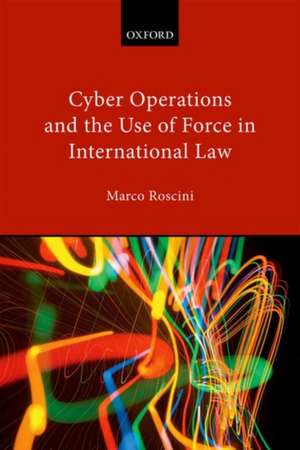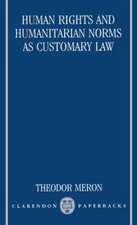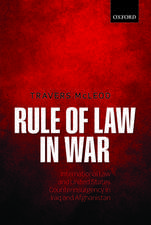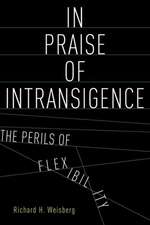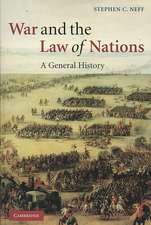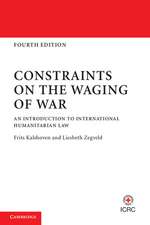Cyber Operations and the Use of Force in International Law
Autor Marco Roscinien Limba Engleză Paperback – 16 iun 2016
| Toate formatele și edițiile | Preț | Express |
|---|---|---|
| Paperback (1) | 307.90 lei 31-37 zile | |
| OUP OXFORD – 16 iun 2016 | 307.90 lei 31-37 zile | |
| Hardback (1) | 849.09 lei 31-37 zile | |
| OUP OXFORD – 12 mar 2014 | 849.09 lei 31-37 zile |
Preț: 307.90 lei
Nou
Puncte Express: 462
Preț estimativ în valută:
58.94€ • 64.04$ • 49.54£
58.94€ • 64.04$ • 49.54£
Carte tipărită la comandă
Livrare economică 09-15 aprilie
Preluare comenzi: 021 569.72.76
Specificații
ISBN-13: 9780198790716
ISBN-10: 0198790716
Pagini: 336
Dimensiuni: 155 x 232 x 18 mm
Greutate: 0.5 kg
Editura: OUP OXFORD
Colecția OUP Oxford
Locul publicării:Oxford, United Kingdom
ISBN-10: 0198790716
Pagini: 336
Dimensiuni: 155 x 232 x 18 mm
Greutate: 0.5 kg
Editura: OUP OXFORD
Colecția OUP Oxford
Locul publicării:Oxford, United Kingdom
Recenzii
[Cyber Operations and the Use of Force in International Law] offers a precise, detailed and up-to-date analysis of cyber operations and the use of force in international law... [Roscini's] book is an extremely valuable and recommended tool in the quest of understanding the current legal regulation of cyberspace and cyberwarfare.
The book by Marco Roscini offers a precise, detailed and up-to-date analysis of cyber operations and the use of force in international law. His book is an extremely valuable and recommended tool in the quest of understanding the current legal regulation of cyberspace and cyberwarfare.
Cyber Operations provides an excellent overview of the international laws applicable to cyber attacks (a term of art) and will make its readers think twice about how they use cyber terminology. It is meticulously researched with a whopping 1,807 footnotes and cites leading authorities on the law of armed conflict, as well as on international law. In todays interconnected world, completely dependent on computers and the internet (where economic security is national security), it will stimulate both lawyers (military, government, private sector, etc.) and laypersons to think about how much more we should all be doing to protect our networks, data, intellectual property and critical infrastructure.
Land, sea and air are no more the only domains where hostilities are conducted. Cyberspace has now become the fourth dimension. Marco Roscini's book on Cyber Operations and the Use of Force in International Law explores this new and challenging subject. Taking into account recent State practice, the author relies on traditional customary and treaty law to construe rules applicable to cyber operations. He examines all the main chapters of the law of armed conflict: jus ad bellum, jus in bello and the law of neutrality. A sound knowledge of the law of armed conflict allows the author to formulate a complete set of rules for cyber operations in a clear and realistic mode. Dr. Roscini's book is to be recommended to the attention of scholars, legal advisors and to all concerned with planning defence operations.
The increasing amount of cyber attacks and cyber exploitation operations by States and non-State actors calls for a comprehensive review of the current legal framework and its loopholes. Marco Roscini's admirable study of pertinent rules of international law, whether based on treaty or custom, underlines the applicability of existing law to new technological developments. His convincing examination of relevant rules of the jus ad bellum, the jusin bello and the law of neutrality will facilitate implementation of the law in a particularly complex environment and may also help to inform peacetime cooperation on cyber security for which sustainable efforts and effective new regulation are urgently required.
It will come as no surprise to anyone who has read any of Roscini's previous work to hear that Cyber Operations and the Use of Force in International Law is a very well written book. It is engaging to read, focused and clear throughout. There are helpful touches, like the bullet point summaries at the end of each chapter listing the key points made therein, or the handy tables setting out the analysis in a different form for quick reference... the book is extremely well researched and provides detailed analysis on virtually any question that one might raise on the application of the jus ad bellum or jus in bello to cyber warfare. Roscini is now one of the leading legal experts in the world on cyber operations. . . [This book] is essential reading for anyone interested in cyber war and international law.
Marco Roscini's book engages in a detailed, rigorous and well informed doctrinal analysis of the application of this legal framework to cyber operations, which singles it out as a highly significant resource in the field... [T]his book is an exhibition of excellent legal scholarship. In chapter 1 Roscini explains that the book's 'overall goal is to provide a systematic and coherent analysis of the international law applicable to military cyber operations that will be of use to anyone who wants or needs to understand the basic issues of the rules of international law on the use of force and the law of armed conflict'. Incontrovertibly, this book successfully and impressively achieves this objective.
Mr. Roscini should be praised for writing a book that goes beyond existing analysis of the law of armed conflict applied to cyber. Earlier legal monographs on cyber warfare restated the principles of laws and attempted to awkwardly apply them to cyber, with varying degrees of success. Many lacked an understanding of the technical aspects of cyber. Mr. Roscini, on the other hand, has clearly spent time studying the legal but also the technical aspects of cyber. The result is a monograph that does not merely repeat legal principles in an abstract manner but rather presents the legal rules with a technical hindsight, highlighting their potential flaws and gaps in the cyber area.
The sections of Roscinis book on the jus ad bellum cyber aspects are well-written, engaging, and thoroughly researched. They will also be accessible to non-lawyers, which makes this book particularly appealing. It is not easy to pick apart rules that were designed and adopted in a different era before the prospect of cyber attacks were even conceivable, and accurately apply them at a time before cyber uses of force have become a concrete reality, and overall Roscini has done a commendable job.
Roscinis volume is a welcome addition to existing literature in the field. The way in which the author uses concrete cases of cyber operations as practical, real-world examples of the types of attacks which have taken place and his subsequent legal assessment make this volume a much valued navigation tool, useful to appraise the current state of legal development in the area. The detail and breadth of information found in all of the chapters is remarkable, and the book will quickly become a required reading for anyone who wishes to contribute in a qualified manner to the debate on cyber warfare.
The book by Marco Roscini offers a precise, detailed and up-to-date analysis of cyber operations and the use of force in international law. His book is an extremely valuable and recommended tool in the quest of understanding the current legal regulation of cyberspace and cyberwarfare.
Cyber Operations provides an excellent overview of the international laws applicable to cyber attacks (a term of art) and will make its readers think twice about how they use cyber terminology. It is meticulously researched with a whopping 1,807 footnotes and cites leading authorities on the law of armed conflict, as well as on international law. In todays interconnected world, completely dependent on computers and the internet (where economic security is national security), it will stimulate both lawyers (military, government, private sector, etc.) and laypersons to think about how much more we should all be doing to protect our networks, data, intellectual property and critical infrastructure.
Land, sea and air are no more the only domains where hostilities are conducted. Cyberspace has now become the fourth dimension. Marco Roscini's book on Cyber Operations and the Use of Force in International Law explores this new and challenging subject. Taking into account recent State practice, the author relies on traditional customary and treaty law to construe rules applicable to cyber operations. He examines all the main chapters of the law of armed conflict: jus ad bellum, jus in bello and the law of neutrality. A sound knowledge of the law of armed conflict allows the author to formulate a complete set of rules for cyber operations in a clear and realistic mode. Dr. Roscini's book is to be recommended to the attention of scholars, legal advisors and to all concerned with planning defence operations.
The increasing amount of cyber attacks and cyber exploitation operations by States and non-State actors calls for a comprehensive review of the current legal framework and its loopholes. Marco Roscini's admirable study of pertinent rules of international law, whether based on treaty or custom, underlines the applicability of existing law to new technological developments. His convincing examination of relevant rules of the jus ad bellum, the jusin bello and the law of neutrality will facilitate implementation of the law in a particularly complex environment and may also help to inform peacetime cooperation on cyber security for which sustainable efforts and effective new regulation are urgently required.
It will come as no surprise to anyone who has read any of Roscini's previous work to hear that Cyber Operations and the Use of Force in International Law is a very well written book. It is engaging to read, focused and clear throughout. There are helpful touches, like the bullet point summaries at the end of each chapter listing the key points made therein, or the handy tables setting out the analysis in a different form for quick reference... the book is extremely well researched and provides detailed analysis on virtually any question that one might raise on the application of the jus ad bellum or jus in bello to cyber warfare. Roscini is now one of the leading legal experts in the world on cyber operations. . . [This book] is essential reading for anyone interested in cyber war and international law.
Marco Roscini's book engages in a detailed, rigorous and well informed doctrinal analysis of the application of this legal framework to cyber operations, which singles it out as a highly significant resource in the field... [T]his book is an exhibition of excellent legal scholarship. In chapter 1 Roscini explains that the book's 'overall goal is to provide a systematic and coherent analysis of the international law applicable to military cyber operations that will be of use to anyone who wants or needs to understand the basic issues of the rules of international law on the use of force and the law of armed conflict'. Incontrovertibly, this book successfully and impressively achieves this objective.
Mr. Roscini should be praised for writing a book that goes beyond existing analysis of the law of armed conflict applied to cyber. Earlier legal monographs on cyber warfare restated the principles of laws and attempted to awkwardly apply them to cyber, with varying degrees of success. Many lacked an understanding of the technical aspects of cyber. Mr. Roscini, on the other hand, has clearly spent time studying the legal but also the technical aspects of cyber. The result is a monograph that does not merely repeat legal principles in an abstract manner but rather presents the legal rules with a technical hindsight, highlighting their potential flaws and gaps in the cyber area.
The sections of Roscinis book on the jus ad bellum cyber aspects are well-written, engaging, and thoroughly researched. They will also be accessible to non-lawyers, which makes this book particularly appealing. It is not easy to pick apart rules that were designed and adopted in a different era before the prospect of cyber attacks were even conceivable, and accurately apply them at a time before cyber uses of force have become a concrete reality, and overall Roscini has done a commendable job.
Roscinis volume is a welcome addition to existing literature in the field. The way in which the author uses concrete cases of cyber operations as practical, real-world examples of the types of attacks which have taken place and his subsequent legal assessment make this volume a much valued navigation tool, useful to appraise the current state of legal development in the area. The detail and breadth of information found in all of the chapters is remarkable, and the book will quickly become a required reading for anyone who wishes to contribute in a qualified manner to the debate on cyber warfare.
Notă biografică
Marco Roscini is Professor of International Law at the University of Westminster Law School. Prof. Roscini has a PhD from the University of Rome 'La Sapienza' and was previously a Research Fellow in International Law at the University of Verona School of Law. He lectured in international security law at University College London (UCL), King's College London, Queen Mary University of London, and the Ecole des Relations Internationales in Paris. He has published a monograph on nuclear-weapon-free zones and is the co-editor of Non-Proliferation Law as a Special Regime . Prof. Roscini is a member of the International Law Association (ILA)'s Committee on Nuclear Weapons, Non-proliferation and Contemporary International Law, of the Academic Network (AN) Programme on International Cyber Security, and of the EU Non-proliferation Consortium. In 2012, he was awarded a Leverhulme Research Fellowship for the academic year 2012-2013 to conduct his research on cyber operations.
